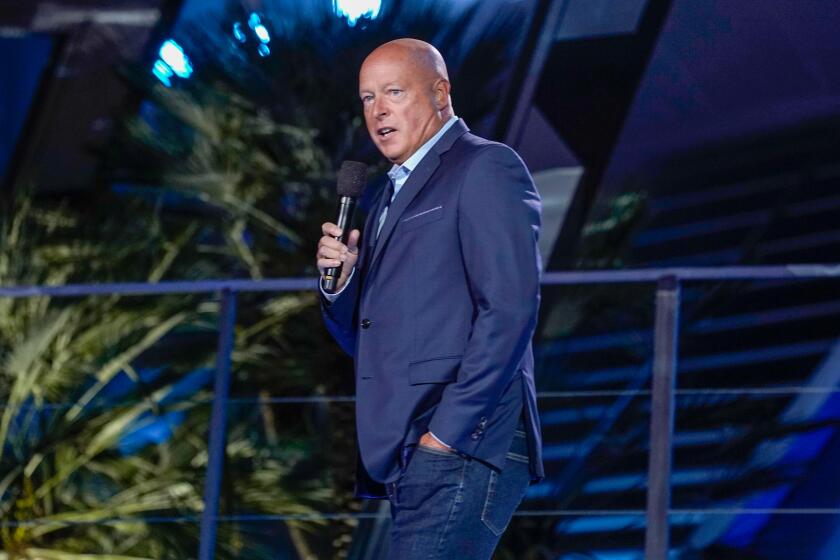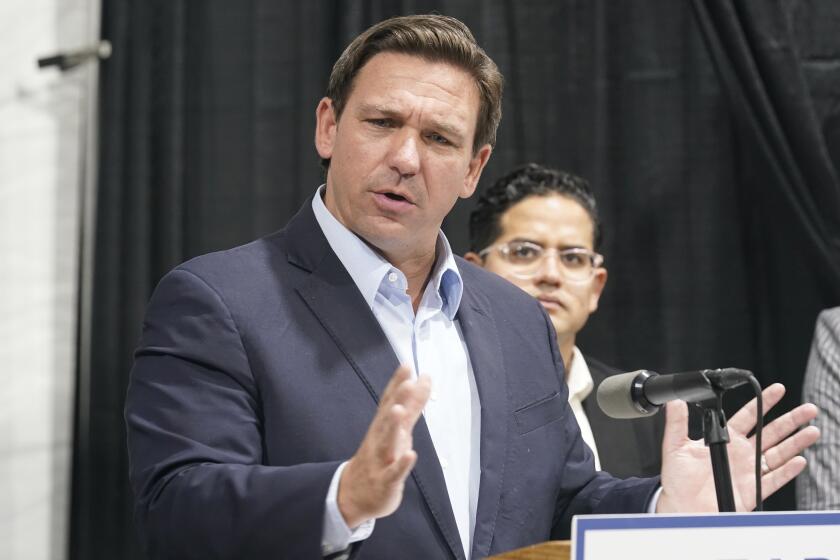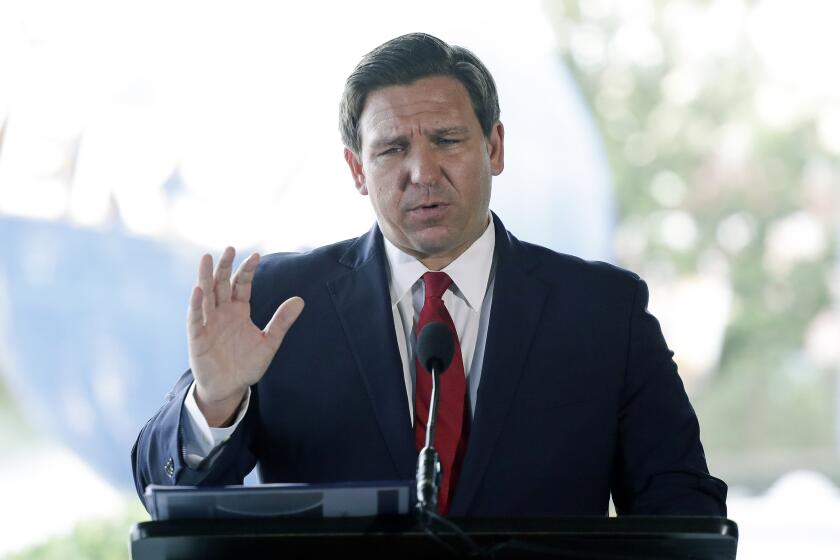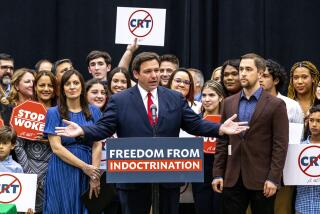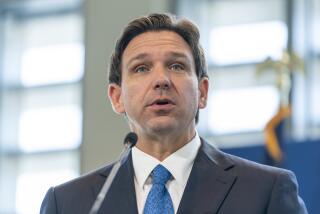Column: In Florida, Disney learns what happens when its politicians won’t stay bought
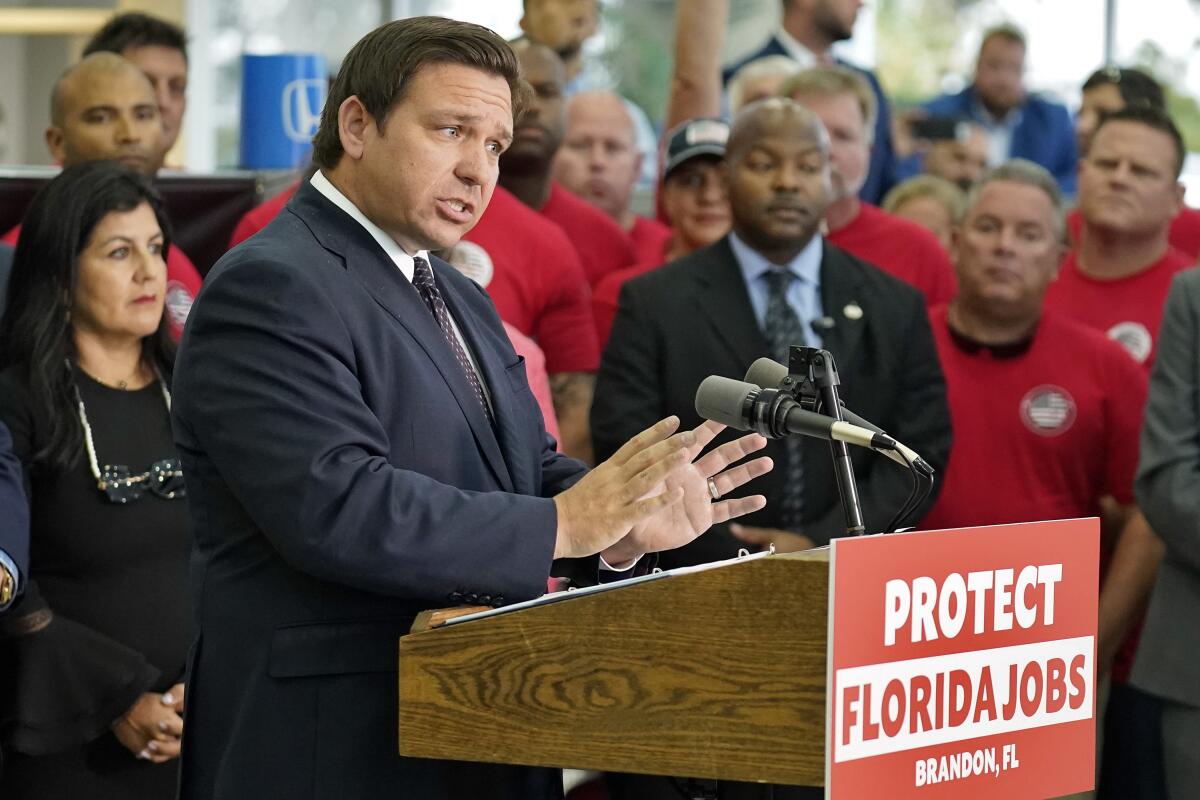
Walt Disney Co. has dominated Florida for so long that the very idea of a backlash from the state’s political leaders has been unimaginable.
Yet here we are. Republican Gov. Ron DeSantis and his GOP colleagues in the state legislature are threatening to bring the hammer down on the entertainment behemoth.
Why? Because Disney is expressing disapproval of their latest effort to pander to their far-right base, the so-called “Don’t Say Gay” law aimed at oppressing transgender people.
The threat is a warning to all the other businesses in the Sunshine State and across the country who may be thinking about challenging conservative policy in Florida.
— Political scientist Aubrey Jewett, on Florida Gov. DeSantis’s campaign against Disney
DeSantis and his fellows are threatening to revoke Disney’s near-dictatorial control over the 43-square-mile site of Walt Disney World and its related theme parks and resorts outside Orlando, the product of a deal that Florida’s then-Republican governor, Claude Kirk, signed into law in 1967.
Is this threat plausible? That hinges on the question of whether Florida’s Republicans are so obstinate about appealing to the most conservative wing of their political base by campaigning against Disney’s perceived “wokeness” that they will risk slaying the golden goose that the company has been for them.
Get the latest from Michael Hiltzik
Commentary on economics and more from a Pulitzer Prize winner.
You may occasionally receive promotional content from the Los Angeles Times.
“Right now it’s a shot across Disney’s bow, a warning to ‘stay in your lane,’” says Aubrey Jewett, a political scientist at the University of Central Florida who has followed the relationship between Disney and Florida for years.
“The chances of its going forward are pretty slim, but I don’t think the chances are zero,” Jewett told me. “In the last few years, the Republican Party in Florida has changed from a pro-business party to one where the Trump social conservative wing is in ascendance.”
Make no mistake: DeSantis and his allies are targeting more than merely Walt Disney Co.
“The threat is a warning to all the other businesses in the Sunshine State and across the country who may be thinking about challenging conservative policy in Florida,” Jewett says.
Disney, Florida’s most powerful corporation, greets the state’s attack on LGBTQ+ kids with silence.
“If the legislature and governor are willing to take on the most powerful and influential company in Florida that is a critical asset to the state’s economy and that has heavily supported Republicans in the past, then they clearly are more than willing to take on every other company that might decide to challenge them,” Jewett adds. “And that is a powerful incentive for other companies to stay quiet on controversial issues.”
The arrangement targeted by DeSantis and his colleagues is the 1967 creation of the Reedy Creek Improvement District.
That gave Disney enormous power over the proposed site of Walt Disney World, triggering the truly epic growth of the Orlando area from a zone that, as Robert N. Jenkins of the St. Petersburg Times described it years later, “had more citrus trees than people, more marsh than development, more cattle pasture than parking lot.”
The two counties that became Disney’s Florida domain then had about 370,000 residents, some of whom were “selling pecan logs and painted coconut heads to tourists passing on their way to beaches east and west,” Jenkins observed.
Now their population is 1.8 million and the region attracts more than 17 million visitors annually, making it the fourth most popular tourist destination in the country.
No one can question the economic impact of Disney’s arrival in Florida. A 2019 study estimated that tourism directly or indirectly supported more than 463,000 jobs, or 41% of the Orlando region’s workforce. Disney alone employed some 80,000 workers. Tourism generated $5.8 billion in local and state taxes in 2018.
In some ways, it’s hard to choose whom to support in this battle, since both contestants are detestable in their own way.
DeSantis, who is intent on running for president, has turned himself into the quintessential right-wing culture warrior. Aligning himself with opponents of masks and social distancing to battle the COVID pandemic, he has undermined his state’s response to the point where its death rate from the disease is one of the worst in the country.
Florida’s new surgeon general, Joseph Ladapo, has questioned the safety of COVID vaccines, despite overwhelming evidence that they are safe and effective.
The law that he signed last month, labeled “Don’t Say Gay” by its critics, restricts the teaching of gender issues in Florida schools and is plainly an attack on transgender students. Its enactment produced the backlash from Disney — sparked by employee protests — that DeSantis and his allies claim to consider so irksome.
Disney, for its part, has made sure that its corporate interests remain paramount in the minds of Florida policymakers — lobbying for laws that benefit its operations and training a fire hose of cash on politicians and their political action committees.
Disney political contributions added up to roughly $50 million from 1996 through 2021, according to official campaign disclosures.
Although the company has contributed to both political parties, more of its contributions have gone to Republicans than Democrats — $7.6 million to the Republican Party versus $2.9 million to the Democratic Party in that time frame. About $107,000 has gone to DeSantis’ campaigns.
Outside purely partisan matters, Disney almost always gets what it wants in Florida. Consider a 2018 ballot initiative on casino gambling. Disney loathes casino gambling, for an obvious reason — every dollar that passes over the gaming tables is one dollar less that can be spent at its theme parks; virtually uniquely in the cruise ship industry, Disney ships don’t have casinos.
The 2018 “Voters in Charge” initiative was designed to take the authority to expand casino gambling away from Florida legislators and give it to voters.
Widely seen as a measure to restrict casinos in Florida, it was funded with $20.6 million in Disney cash. The only larger contributor was the Seminole tribe, which holds a monopoly on casino gambling in the state and donated $24.3 million. The measure passed, 71.5% to 28.5%.
Florida Gov. DeSantis is running a victory lap over his COVID-19 response as the press plays along.
In 2012, a Disney lobbyist got caught up in what became dubbed the “textgate” scandal — she was found to be texting Orange County, Fla., commissioners during a hearing at which they were considering delaying the placement of a measure on the local ballot that would require sick time be extended to employees.
Disney, as well as other big leisure employers in the area, was critical of the measure. During that hearing, County Commissioner Jennifer Thompson and Disney lobbyist Sharon Smoley texted each other 32 times, according to official disclosures.
Thompson called the exchanges “girl talk” and Smoley denied that lobbying over the ballot measure was involved. When authorities attempted to subpoena the texts, however, the county commissioners said they had all been deleted.
The measure was blocked and the politicians fined $500 each, on grounds that they didn’t know the records they deleted were legally required to be preserved.
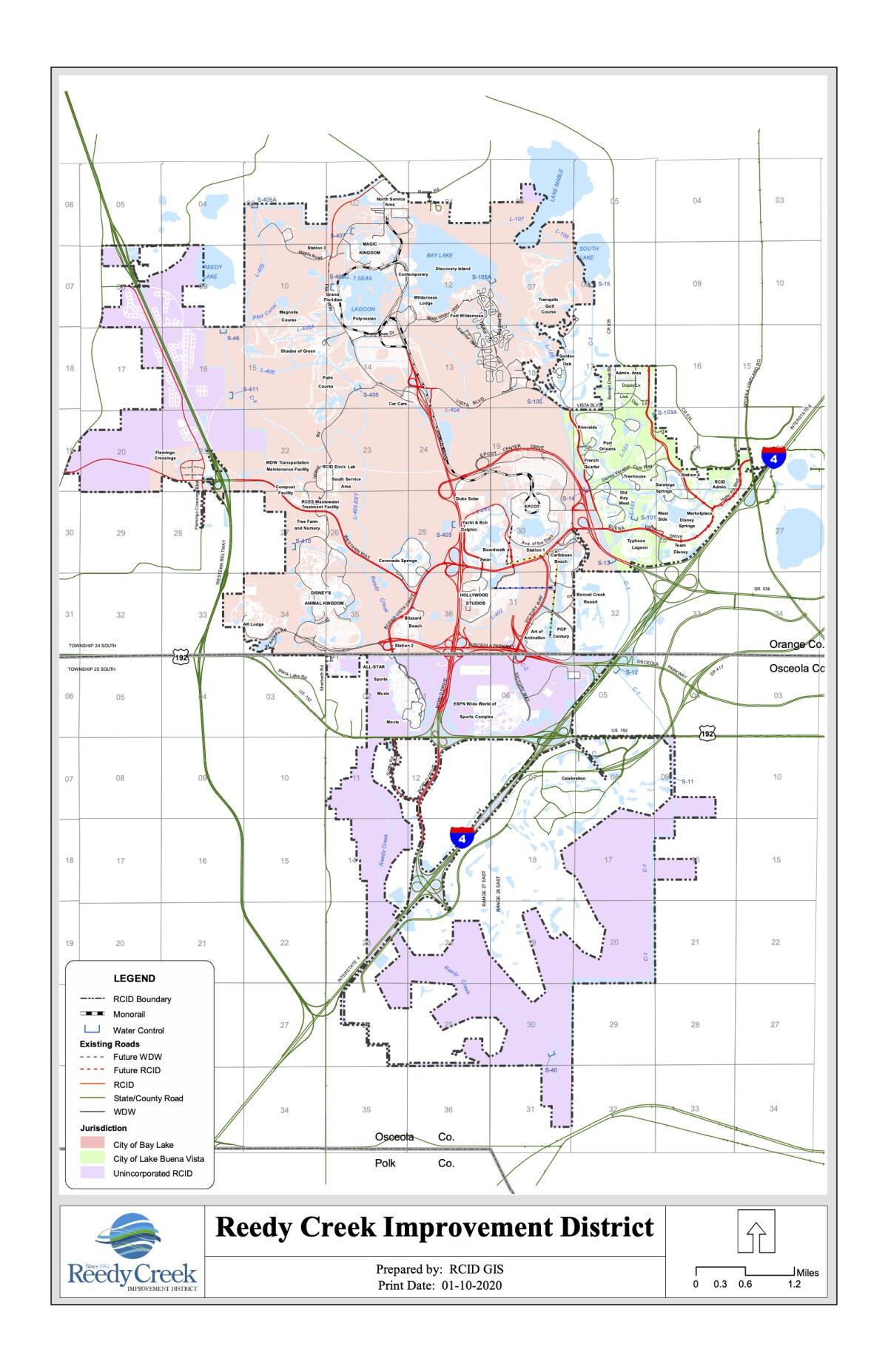
Disney’s campaign spending and political lobbying make a mockery of the claim of Disney Chief Executive Bob Chapek last month that the company’s entertainment products — “all of our diverse stories,” as he put it — “are more powerful than any tweet or lobbying effort.”
Chapek was responding then to Disney employees’ outrage that the company had remained silent as the “Don’t Say Gay” bill moved through the legislature and toward DeSantis’ signature.
“The best way for our company to bring about lasting change,” Chapek said, “is through the inspiring content we produce, the welcoming culture we create, and the diverse community organizations we support.”
The key to Disney’s power in Florida is the 1967 creation of the Reedy Creek Improvement District, the 27,258-acre municipal kingdom, almost as large as the city of San Francisco, over which the company wields almost unchallenged power.
The company began purchasing the land secretly in the early 1960s, working through front companies and a Miami law firm. By 1967 it had acquired all the property for $5 million, or less than $200 an acre.
Reedy Creek’s creation was an essential step in the development of Walt Disney World. The company was determined to have indisputable control of the site of its new theme park along with room for expansion and a large buffer zone.
Walt Disney himself was determined, as he put it himself, to “control the area, so that it does not become the jungle of signs, lights and fly-by-night operations that have ‘fed’ on Disneyland’s audience.” But the deal also gave Disney the authority to issue bonds to develop the property — at the low interest rates enjoyed by municipal securities.
Reedy Creek has the trappings of an independent local governmental unit, but that’s just a veneer. The district’s charter apportions voting rights on a one-vote-per-acre of land ownership, which is sharply limited. Although the original plans for Disney World envisioned Epcot as a residential development, that feature disappeared when the company realized that permanent residents would have to hold voting rights, urban planner Steve Mannheim reported in his 2002 book about Epcot.
Indeed, Disney may never have been serious about Epcot as a residential community, though it plied local officials with the idea that residential development warranted making Reedy Creek a special district. “They wanted the powers of government,” historian Richard E. Foglesong wrote in a 2001 book about the project, “but not real residents who could challenge their managerial prerogatives.”
Woe betide the civic leader in a company town who threatens to buck the company’s interests.
According to a 2016 disclosure statement for bonds the district issued, almost all the voting power is vested in Disney, which directly controls property constituting $8 billion of the $9.4-billion assessed valuation of the district (or about 85%).
Most of the rest is held by Disney lessees such as the Four Seasons resort chain and other hotel and restaurant firms, none of which is likely to vote against Disney’s interests.
Although the company pays taxes to the state and to Orange and Osceola counties, it also charges itself property taxes — nearly $150 million in 2020, according to the latest Reedy Creek annual report. That money is spent on debt service and services around the theme parks and resorts.
Only about 44 individuals, residents of two mobile home parks in the district, have votes, an arrangement that resembles the “rotten boroughs” of British history — parliamentary districts controlled by individual squires. Britain outlawed rotten boroughs in 1832, or 135 years before Disney created Reedy Creek.
The district is required by state law to have a board of supervisors that meets monthly in public; in practice, Reedy Creek’s five supervisors meet perfunctorily for about a half-hour per month. The board’s November 2021 meeting clocked in at nine minutes.
It should be plain that there are reasons to question Disney’s authority over such a large and productive swath of land. But the time to have raised those questions was 55 years ago, on sound public policy grounds. Not today, when repealing Reedy Creek is presented openly by its advocates as retaliation against Disney for daring to speak out against Florida Republicans’ reactionary policies.
Whether the legislature would go through with repealing the Reedy Creek designation is still anyone’s guess. It would not be simple, for local services costing tens of millions of dollars a year would have to be transferred to the two counties after a half-century of independence. But it wouldn’t be impossible; after all, the region’s other theme parks, including Universal Studios and Sea World, fall outside Reedy Creek.
“It could be done,” Jewett says. But would Florida’s politicians really want the responsibility? “If there was an economic downturn of any sort, with people losing their jobs and tax revenues going down, the legislators would open themselves up to attack.”
So which will it be, Florida legislators? Use Disney as a target in your culture wars, risking that the company will turn off the financial spigot from which you have drunk so heartily for more than 50 years? Or capitulate to its power, as you’ve done for 50 years?
More to Read
Get the latest from Michael Hiltzik
Commentary on economics and more from a Pulitzer Prize winner.
You may occasionally receive promotional content from the Los Angeles Times.
